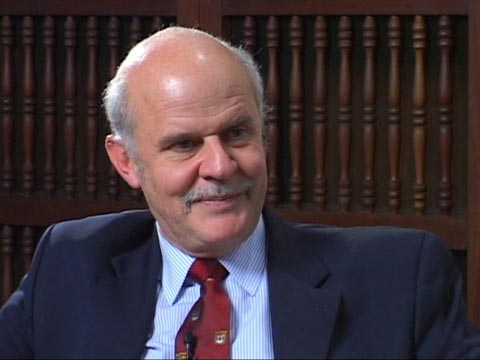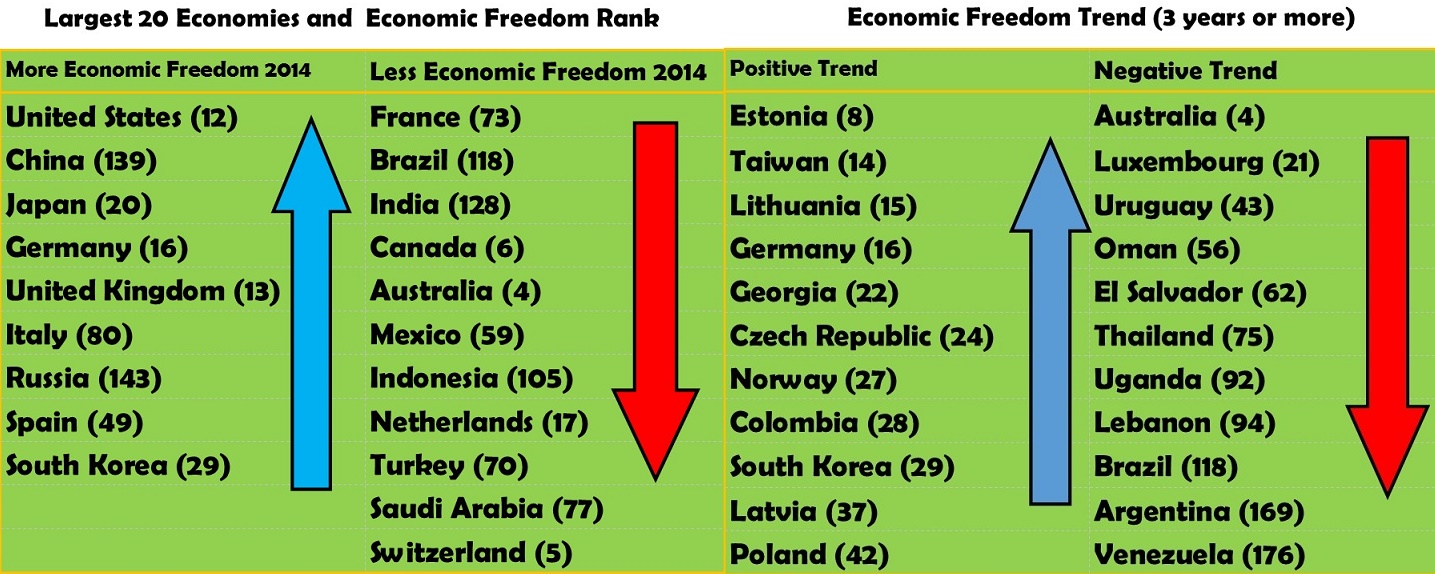 Over two decades of measurements confirm that economic freedom is not “distributed” equally around the globe. Luckily we don’t have a world government and so we can’t blame a central authority. Some conspiracy theorists argue that the economy is at the mercy of hidden global governments, with some of their puppet masters gathering in the past at the Trilateral Commission and today at the World Economic Forum. International organizations such as the World Bank, or the European Central Bank can create incentives that affect economic restrictions and freedoms differently across nations. Business and government elites might have some influence, yet, in the end, it is each local government that decides the regulatory environment, the level of taxation and spending and, more important, the enactment and equal enforcement of just laws.
Over two decades of measurements confirm that economic freedom is not “distributed” equally around the globe. Luckily we don’t have a world government and so we can’t blame a central authority. Some conspiracy theorists argue that the economy is at the mercy of hidden global governments, with some of their puppet masters gathering in the past at the Trilateral Commission and today at the World Economic Forum. International organizations such as the World Bank, or the European Central Bank can create incentives that affect economic restrictions and freedoms differently across nations. Business and government elites might have some influence, yet, in the end, it is each local government that decides the regulatory environment, the level of taxation and spending and, more important, the enactment and equal enforcement of just laws.
The 2015 Index of Economic Freedom (The Heritage Foundation-The Wall Street Journal) released yesterday, again shows Hong Kong (1st) as having the freest economy. Last year was a challenging year for this dynamic entrepreneurial civil society. In the foreword to the index, Paul Gigot, editorial page editor of the Wall Street Journal, writes that “Hong Kong’s struggle is also the reminder that economic liberty is not guaranteed, and the wealth of Nations can rise and fall with surprisingly rapidity.”
Source: 2015 Index of Economic Freedom, The Heritage Foundation in partnership with The Wall Street Journal, ed. Terry Miller, Anthony B. Kim
Source: 2015 Index of Economic Freedom, The Heritage Foundation in partnership with The Wall Street Journal, ed. Terry Miller, Anthony B. Kim
Gigot’s warning also applies to Chile (7th), another economy highly ranked. It scored an impressive 78.5, lower than the last two years but still enough to earn the country first place in Latin America and the seventh overall. The challenges faced by Chile are different than those faced in Hong Kong. The internal ideological environment in the South American country has turned surprisingly fast towards egalitarian socialism. They do not have a Beijing to blame. Venezuelan and Cuban operatives, as well as Ivy League professors and other academics, play a role in creating 21st century socialism, but they need willing accomplices in the Chilean academy and in the political and business world in order to be effective. Just weeks ago the educational and fiscal reforms passed by the government are taking Chile backwards several decades.
Singapore ranks second and New Zealand third. Both have a chance to pass Hong Kong next year. Transparency, or freedom from corruption, represents only 10% of the index. Over a decade ago I developed an index of “clean economic freedom” where I give equal weight to economic freedom and transparency. New Zealand (3rd) was and remains the world champion of clean freedom.
After several years of decline, the United States reversed course and had a slight improvement. With the score of 76.2 the U.S. economy ranks 12th in the world. The only area where it showed a decline was in business freedom. The study states that “the regulatory burden has been mounting. Since 2009, over 150 new major regulations have been imposed at the annual cost of more than $70 billion.” The most ominous trend, as I have mentioned in previous columns is on respect for rule of law. If we focus on the long-term (since 1995) the United States suffered a 10 point decline in its respect for property rights and a 17 point decline in freedom from corruption.
The United Kingdom also shows improvement. It scored 75.8 and ranks 13th just behind the United States. It has been improving since 2012 when it scored just over 74. Focusing on the long-term, corruption scores have also deteriorated. The U.K. lost 14 points since 1995. But in respect of property rights, the U.K. scores a 90 and is third in the world. The best improvement during these last 20 years has been in the area of freedom to invest. Its score improved 20 points since 1995 ranking second in the world. One can see why London’s downtown real estate has skyrocketed in price. It is only natural that millionaires around the world are investing in properties in the City.
Trends are more helpful than a yearly picture of economic freedom. Several countries have shown improvement for three years in a row. Lithuania (15th), Poland (42nd), South Korea (29th), Taiwan (14th), and United Arab Emirates (25th), are among the economies which have improved their scores for an even longer time. On the negative side, some of the freest countries, including some that rank near the top in economic freedom, like Australia (4th), have seen declines in economic freedom for three years in a row.
Several of the countries with low economic freedom have seen improvements during the last three years. These include China (139th), Russia (143rd), and even Iran (171st). Starting from a low level of economic freedom, however, does not guarantee improvement: Argentina (169th), Venezuela (176th), already ranking low in 2011, have continued to lose ground. Other countries with declines during the last three years include Uganda (92nd), Thailand (75th), Oman (56th), and even tiny Luxembourg (21st). Despite being the darling in some libertarian circles for having liberalized marihuana laws, Uruguay (43rd) shows constant declines in economic freedom since 2011.
The Philippines (76th) and Portugal (64th) had a good performance for three years in a row. Germany (16th), the most powerful country in Europe, also shows continued improvement since 2012, increasing its score from 71 to almost 74. Italy (80th) also shows three straight years of improvement.
The Scandinavian countries continue to benefit from their respect for the rule of law. They score among the less free if we just measure fiscal freedom and government spending but they compensate by the higher respect that they have for the rules of the game, even if some of those rules create inefficiencies. Norway (27th) is a case in point. It scores almost in the bottom of the world in government size and yet its economic freedom score has improved during the last three years.
If we focus on the 20 largest economies, which represent over 80 percent of the world GDP, we find that 11 of the countries saw a declining score and nine saw an improvement. If we include all the smaller economies, 101 out of the 178 in the sample saw an improvement, but many of those countries have very small economies. It is fair to say that progress towards more economic freedom has slowed down.
The concept of unequal distribution of economic freedom applies better at national level. The human right to economic liberty is enforced unequally. Some governments allow their citizens to keep most of what they earn but fail miserably at enforcing equality before the law. Most Central American countries and some African countries are cases in point. Guatemala (87th) scores 3rd best in low government spending, and Sudan (*) 2nd, but both rank dismally in rule of law. At the other end we have Scandinavian countries which tax heavily and have huge government spending but excel at providing transparency and more stable regulatory and monetary frameworks. Denmark (11th) ranks best in the world in rule of law, but has one of the highest levels of government spending in the world. The index shows that, except for few exceptions, like the United States, countries with better rule of law have much lower income inequality.
The unequal distribution of economic freedom might not be as an attractive topic as income inequality. But as it creates unjust income inequalities, political and intellectual entrepreneurs should work hard to mitigate it by expanding freedoms. The Index of Economic Freedom, and its competitor the Economic Freedom of the World, are immensely valuable guides.
Note: In parenthesis economic freedom rank. (*) Sudan with no global score for insufficient information.
* Alejandro Antonio (Alex) Chafuen, Ph.D., has been president of Atlas Economic Research Foundation since 1991. A member of the board of advisors to The Center for Vision & Values and a trustee of Grove City College, he is also the president and founder of the Hispanic American Center of Economic Research. Dr. Chafuen serves on several boards including the Chase Foundation of Virginia, the Acton Institute, the Fraser Institute (Canada), and is an Active Honorary Member of the John Templeton Foundation.
Source: Forbes.com












Discussion
No comments for “World: The Unequal Respect For The Human Right To Economic Liberty – by Alejandro Chafuen”